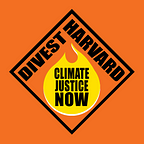Divest Celebrates Victory, Unveils Reinvestment Platform
Last fall, the movement forced Harvard to commit to divestment. Celebrating its historic year, FFDH talks about what’s next
In the fall of 2021, Fossil Fuel Divest Harvard (FFDH) won a ten year campaign to force Harvard, the world’s richest private university, to divest from fossil fuels. This week, the movement of students, alumni, and faculty celebrated this historic victory for the institution and planet, and discussed the campaign’s next steps in pushing Harvard to become a climate leader.
This latest announcement comes in the form of Whose University: The Case for Reinvestment at Harvard, a new report released to the public today discussing what the Harvard endowment must do to truly undo the harm perpetuated by Harvard’s years of extractive financial practices, serve its communities, and be a force for good in the world. The report, which marks one of the worldwide divestment movement’s most substantive recommendations to date on best practices for just reinvestment, was written after nearly a year of focus group conversations with stakeholders including Cambridge and Boston community members, local elected officials, experts in climate justice and sustainable community-driven finance, and more.
In order to fulfill its moral, social, and legal obligations, says the document, Harvard needs to engage in nothing short of a paradigm shift in how it manages its investments. Rather than its current model of pursuing short-term profit no matter the long-term consequences, the best interests of the community, planet, and institution necessitate an endowment that serves to be an active force for justice and empowerment. In order to move towards this new vision, it recommends three key steps:
— Invest in the Community
— Invest in the World
— Democratize
“Since its inception, Harvard has believed it has the right to make a profit at any cost, to invest in uncountable extractive industries and look the other way about where its money is going as long as the returns keep coming. Harvard is invested, in every sense of the word, in the extractive economy, an economy that puts profit before people and planet and everything this institution claims to value. And what these new reinvestment demands are about is us making the case publicly, for the first time, that Harvard does not have that right,” said Claire Pryor ‘23.
Read the Report Here: https://tinyurl.com/ReinvestmentReport
Since FFDH’s fall victory, the campaign has been focused on two main main missions: ending Harvard’s other fossil fuel conflicts of interest, and envisioning what just reinvestment of Harvard’s endowment should look like. A first installment of the first goal, a report outlining the many ways in which Harvard’s academic process is held back and university policy has been violated through fossil fuel entanglements, was released last semester. Whose University marks the first public installment of the second goal.
The report was first previewed at Divest Fest, a celebration and rally that took place May 3rd in Harvard Yard. At the event, large numbers of Harvard community members came together to enjoy food, live music, and hear speeches celebrating the campaign’s fall victory. In discussing the urgent need for reinvestment, FFDH organizers were also joined by speakers from the Stop Harvard Land Grabs campaign and the Coalition for a Just Allston Brighton.
“This victory showed that when we fight, we win! Our campaign protested, rallied, and built coalitions until Harvard, one of the richest and oldest schools in the world, had no choice but to agree with us,” said Jade Woods ’22, a Fossil Fuel Divest Harvard organizer.
Follow Fossil Fuel Divest Harvard on Twitter, Facebook, and Instagram. Want to join one of our meetings and see what we’re all about? Fill out this interest form!
